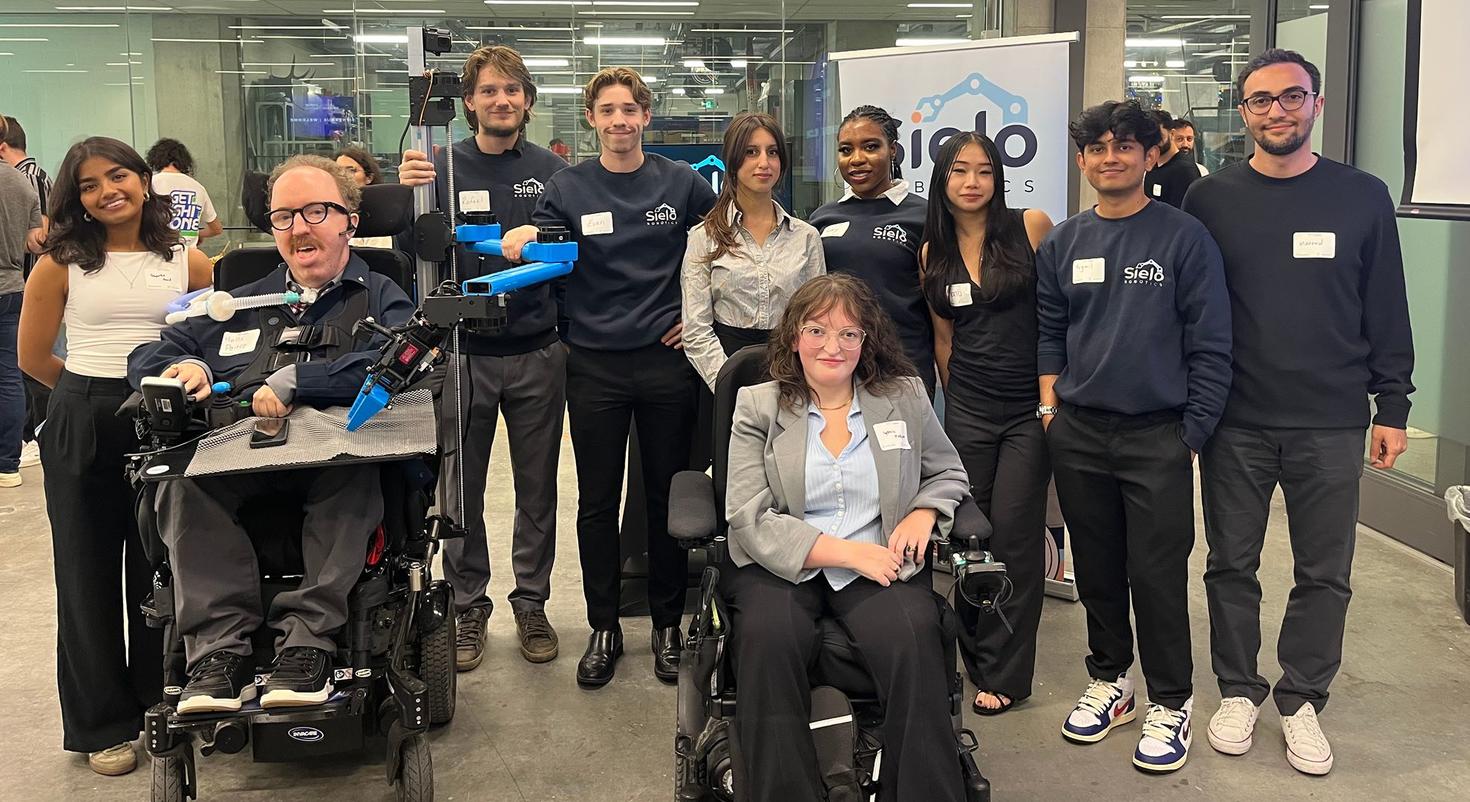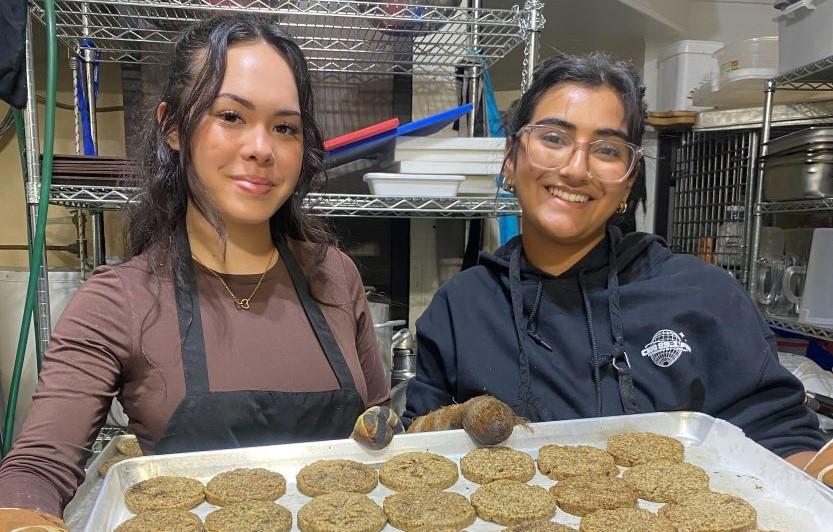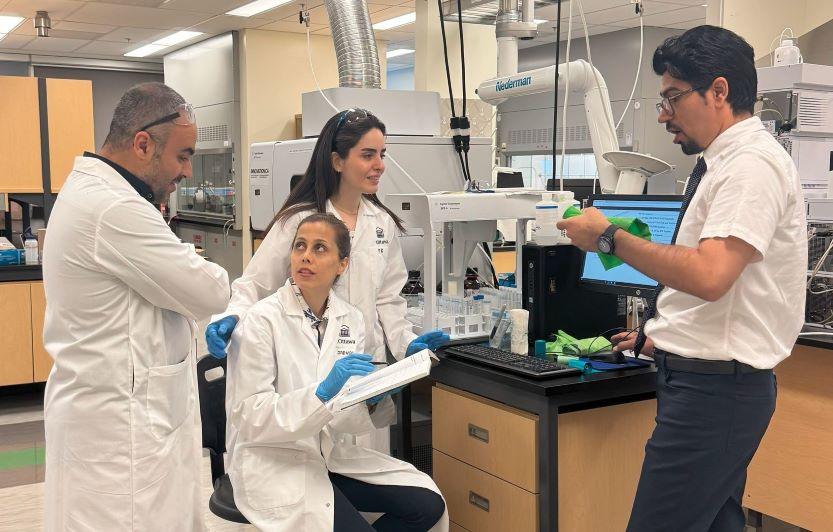Sielo Robotics first developed a robotic arm to help motorized wheelchair users perform daily tasks as part of uOttawa’s Faculty of Engineering GNG2102 engineering design course, in which students co-design solutions that will make a difference for people who face accessibility challenges.
“Our team was matched with Charlotte and Sienna, two incredible young women whose determination and spirit would change the course of our lives,” says Laila Burns, a third-year computer engineering student and chief marketing officer for Sielo. “Charlotte lives with cerebral palsy, and Sienna with arthrogryposis multiplex congenita and dystonia. Both require 24/7 caregiver support for everyday activities — picking up a cup, grabbing a phone, opening a door or adjusting a pillow.
“When we met them for the first time, we didn’t talk about motors, robotics or sensors. We talked about life. What independence meant to them, what their daily routines looked like and where they felt most restricted. They spoke openly about how frustrating it was to need help for small, constant tasks and how this dependency, though necessary, affected their confidence and sense of agency.”
Laila adds: “Then Charlotte said something that we’ll never forget: ‘We wish we had a robotic device to help with the little things we always need help with.’
“That simple sentence shifted everything. It wasn’t just a suggestion—it was a challenge. It carried years of lived experience and the quiet wish to regain control over everyday life. That moment became our spark.”
It took eight months to develop a prototype for a robotic arm, now known as “Arlo.” The core team — CEO Evan Zeglinski-Spinney, a uOttawa electrical engineering and computing technology graduate (’24), Rafaël Hébert, chief technology officer and a master’s student in the uOttawa mechanical engineering program, and Lucy Amos, chief operating officer and a fourth-year student in the uOttawa electrical engineering and computing technology program — made several upgrades over the past three years.
Today, Sielo has secured its first major order from Vista Centre Brain Injury Services for up to 12 Arlo units to be used in a pilot project that will evaluate the arm’s impact on client independence and caregiver workload. The team is also partnering with Bruyère Health and the CHEO Research Institute to run structured trials that collect evidence on the arm’s usability, safety and measurable impact.
Throughout the journey, Sielo has held true to its belief that the people who use assistive technology should be driving the design. The team has conducted over 170 interviews with individuals living with disabilities, caregivers and health-care professionals across Canada, leading to changes ranging from control input types and grip strength to the arm’s weight distribution and reach range.
“This kind of co-design isn’t just user testing, it’s partnership. We don’t build for users — we build with them. Their insights ensure Arlo feels natural, intuitive and empowering, not clinical or intimidating.”
Laila Burns
— Third-year computer engineering student and chief marketing officer for Sielo
As Laila explains, feedback from a user with limited fine motor control led the team to design an adaptive joystick that requires minimal hand movement. Input from occupational therapists helped it fine-tune the arm’s motion speed and introduce safety-stop features, while caregivers showed the team how placement of controls can reduce strain during transfers and reduce the risk of collision.
Leila says that every element of Arlo has been carefully engineered for affordability, reliability and ease of use. It features a custom mechanical design that prioritizes lightweight strength, a control system powered by AI and machine learning, and an intuitive user interface adaptable to individual needs, whether joystick, button or voice control.
uOttawa’s essential entrepreneurial and experiential learning ecosystem
“Without uOttawa’s support, we simply wouldn’t have made it this far,” Laila says.
The Faculty of Engineering’s Centre for Entrepreneurship and Engineering Design provided access to tools, mentorship and spaces like Makerspace, the Brunsfield Centre and the John McEntyre Team Space, labs equipped with 3D printers, computerized numerical control machining, electronics benches and professional-grade tools.
Laila says, “These spaces allowed us to prototype quickly, fail safely and learn hands-on skills.”
Programs like Startup Garage and MakerLaunch provided the business foundation Sielo needed for growth, Laila adds. Startup Garage provided $5,000 in seed funding, mentoring and connections to Ottawa’s entrepreneurial network, which helped refine Sielo’s business model and pitch to investors. MakerLaunch then provided dedicated workspace, technical guidance and access to a network of hardware-focused mentors, who helped the team design for manufacturability and scale.
Sielo also benefited from Mitacs research partnerships, working closely with Professors Francois Robitaille, Jeff Jutai and Pascal Fallavolita, who added expertise in assistive technology, user testing and human-machine interaction. They continue to mentor and guide Sielo's approach as it shifts toward research-based validation and clinical partnerships.
Experiential learning that reaches beyond academics
“Working on Sielo Robotics has turned theory into practice. Everything we learn in our courses — mechanics, control systems, circuits, programming — finds real application in Arlo’s design,” Laila says.
“But beyond academics, Sielo has taught us what it means to lead, to persist and to innovate with empathy. It has connected us to people whose lives depend on the technologies we create, showing us that engineering is ultimately a human profession. It’s changed how we see the world and how we define success, not in grades or prototypes, but in the independence we can help restore.”
Discover how you can benefit from uOttawa’s impactful entrepreneurial ecosystem
- Dreaming of becoming an entrepreneur? You’re in luck! November is Entrepreneurship Month. All students are welcome to attend a series of networking and startup career fair events designed to help you discover how to tap into the spirit of entrepreneurship. Find out more about Entrepreneurship Month events, including Entrepreneurship Week from November 17 to 23.
- Check out the Entrepreneurship Hub and discover how to improve your career-readiness by developing entrepreneurial skills, or how to start or grow your own business.
- Get to know all the eHub programs that help you develop and showcase your entrepreneurial skills. Some pay you a stipend ($325 to $825) when you complete them.
- Explore the Startup Garage, an accelerator program for uOttawa student entrepreneurs who want to start and grow their own businesses. Email Startupgarage@uOttawa.ca if you have any questions.
- Follow the eHub on Instagram (@ehub_uottawa), or check out the eHub on LinkedIn.
- Check programs and courses as well as other initiatives at the Faculty of Science, the Telfer School of Management and the Faculty of Engineering Centre for Entrepreneurship and Engineering Design (CEED).
P.S. Did you know that since 2010, more than 155 new businesses have been created thanks to uOttawa’s entrepreneurship initiatives? You could be the next big thing!


